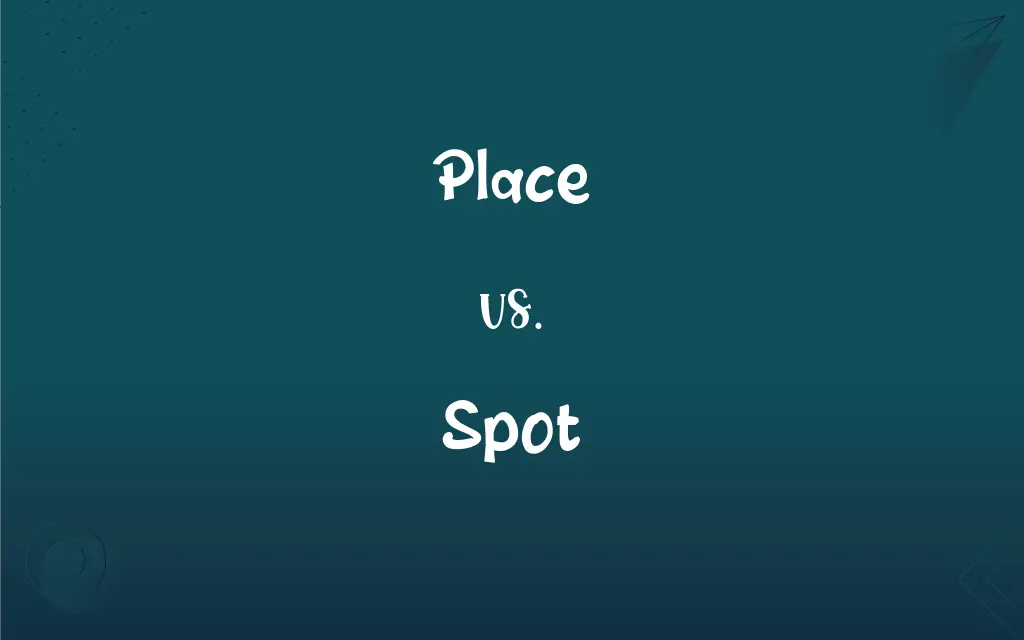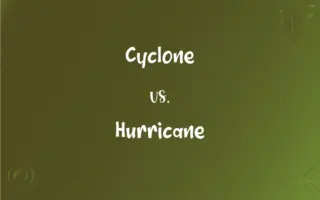Place vs. Spot: What's the Difference?
Edited by Aimie Carlson || By Harlon Moss || Published on January 11, 2024
"Place" refers to a broad location or area, often with a specific purpose or identity, while "spot" indicates a more precise, smaller, or specific point within a larger area.

Key Differences
Place is a general term for any area or location, often used to describe where something is situated or where an event occurs, like a city, home, or venue. Spot, on the other hand, is more specific and refers to a particular point or small area within a larger place, like a spot on a beach.
In terms of size and scope, a place can be large or small but usually encompasses an area with distinct boundaries or characteristics, like a town square or a restaurant. A spot is typically a smaller, more focused location within a place, such as a favorite spot in a park.
When discussing geography or travel, place often refers to a destination with a recognizable identity or function, like Paris or a museum. A spot might be a specific location within these places, like a quiet spot in a bustling city.
In everyday language, place can also refer to a role or position in a social or organizational context, such as someone's place in a family. Spot, in contrast, might be used to describe a particular point in time or situation, like finding oneself in a tough spot.
From a usage perspective, place is a versatile term, used in various contexts to denote location, role, or situation. Spot tends to be more specific, often highlighting a particular point of interest or importance within a larger context.
ADVERTISEMENT
Comparison Chart
Scope and Size
Can be broad or specific, larger areas
More precise, smaller point within a place
Geographical Use
Refers to general locations or destinations
Indicates specific points or areas
Contextual Application
Used for locations, roles, or situations
Used for specific points or moments
Scale of Detail
Less detailed, more general
More detailed, focused on a small area
Common Usage
Versatile in various contexts
Often highlights interest or importance
ADVERTISEMENT
Place and Spot Definitions
Place
Role or Position.
She knows her place in the team.
Spot
Particular Place of Interest.
Let's meet at our usual spot.
Place
Location or Area.
She traveled to a beautiful place in Italy.
Spot
Specific Point or Area.
He found a quiet spot in the library.
Place
Residence or Home.
His place is just around the corner.
Spot
Moment or Instant.
At that spot, she realized her mistake.
Place
Situation or Condition.
They were in a difficult place financially.
Spot
Small Mark or Stain.
There's a spot on your shirt.
Place
Specific Point.
Please put the book back in its place.
Spot
Position or Location.
He held a spot at the top of his class.
Place
An area with definite or indefinite boundaries; a portion of space.
Spot
A mark on a surface differing sharply in color from its surroundings.
Place
Room or space, especially adequate space
There is place for everyone at the back of the room.
Spot
A blemish, mark, or pimple on the skin.
FAQs
Is "place" used in idiomatic expressions?
Yes, in phrases like "out of place" (not fitting in) or "take place" (to occur).
Can "place" imply a role or situation?
Yes, in contexts like "know your place" (understand your role).
Can "place" indicate a building or venue?
Yes, "place" can refer to buildings or venues, like restaurants or theaters.
How is "place" used in sentences?
As a noun (e.g., "This is a nice place.") or a verb (e.g., "Place the book on the table.").
Does "place" have a geographical connotation?
It can, such as referring to towns, countries, or continents.
What is the basic definition of "place"?
"Place" refers to a particular area or location, often used in a general context.
Can "place" refer to a position in a competition?
Yes, like "first place" or "second place."
Is "place" a physical or abstract concept?
It can be both, depending on the context (physical location or role/situation).
Is "place" used in directional phrases?
Yes, like "in place" (correct position) or "out of place" (incorrect position).
Can "spot" mean to notice or see?
Yes, as a verb, it means to notice or identify (e.g., "I spotted a deer in the woods").
Is "spot" appropriate for formal writing?
It can be, but it's often more casual than "place."
Can "spot" mean a position or role?
Less commonly than "place," but it can in contexts like "earning a spot on a team."
Is "place" used in formal writing?
Yes, it's suitable for both formal and informal contexts.
Can "spot" be a stain or mark?
Yes, it can refer to a small mark on a surface.
How does "spot" differ from "place"?
"Spot" is often more specific and can refer to smaller areas than "place."
Can "spot" imply a temporary location?
Yes, like a parking spot or a spot to meet someone.
What does "spot" generally mean?
"Spot" usually refers to a small, distinct area or location.
Is "spot" used in idiomatic expressions?
Yes, like "on the spot" (immediately) or "spot on" (exactly right).
Is "spot" used for precise locations?
Yes, it often indicates a specific, small area.
Does "spot" have a visual implication?
Often, yes, especially when referring to marks or sights.
About Author
Written by
Harlon MossHarlon is a seasoned quality moderator and accomplished content writer for Difference Wiki. An alumnus of the prestigious University of California, he earned his degree in Computer Science. Leveraging his academic background, Harlon brings a meticulous and informed perspective to his work, ensuring content accuracy and excellence.
Edited by
Aimie CarlsonAimie Carlson, holding a master's degree in English literature, is a fervent English language enthusiast. She lends her writing talents to Difference Wiki, a prominent website that specializes in comparisons, offering readers insightful analyses that both captivate and inform.































































